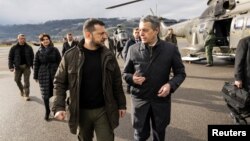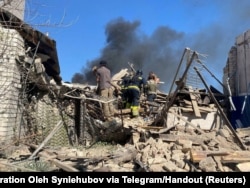Switzerland said Wednesday it will host a high-level international conference in June aimed at ending Russia’s two-year war on Ukraine but acknowledged that Moscow is unlikely to join the peace process.
The conference is set for June 15-16 at the lakeside Burgenstock resort near Lucerne and could draw top officials from dozens of countries. Swiss daily Neue Zürcher Zeitung reported that U.S. President Joe Biden, Ukraine’s key global supporter, may attend, but White House officials said no decision had been made about which U.S. officials may be there.
The conference follows a plan laid out in recent months by Ukrainian President Volodymyr Zelenskyy and Swiss Foreign Minister Ignazio Cassis. The top Swiss diplomat said more than 100 countries would be invited to the conference.
"The first country that we spoke with, after Ukraine, of course, was Russia, because a peace process cannot happen without Russia, even if it won't be there for the first meeting," Cassis told reporters in the Swiss capital, Bern.
Russian Foreign Minister Sergey Lavrov warned last week that any negotiations to end fighting in Ukraine could be successful only if Moscow's interests are taken into account. He called the Swiss round of peace talks a Western ruse to rally broader international support for Kyiv.
Russian President Vladimir Putin has said there will be no peace in Ukraine until Russia's goals are met, although the extent of his current objectives is unclear.
When Russia invaded Ukraine in February 2022 after seizing the Crimean Peninsula in 2014, Putin sought to take over all of Ukraine, a Soviet satellite state until 1991. But the battle lines have been stalemated, with Russia now controlling perhaps a fifth of the country, including Crimea.
Swiss President Viola Amherd called the June meeting a "first step" in a process toward a lasting peace in Ukraine that could lead to a second, follow-up gathering.
"We're not going to sign the peace deal at this conference," she said.
"It has to be clear from the start that Russia — sooner or later — has to be there," Cassis said. "Now, it's not mandatory that it's there the first day. We could also imagine that on the first day, people might agree about how to better invite in Russia."
"We have to agree: That's the backbreaking work ahead of us," he said.
Zelenskyy said in his daily address Wednesday that Ukraine must be able to defend its airspace, its land and its waterways as part of a just end to the war. "We have no right to make a mistake in any of these aspects," he said. There needs to be "a clear position of the world regarding the just end of this war," said the Ukrainian leader.
Russian bombardment
On the battlefront, Ukrainian officials said Wednesday that Russia targeted the country with 17 aerial drones, two cruise missiles and a ballistic missile.
Ukraine’s air force said it shot down 14 of the drones, with the intercepts taking place over the Mykolaiv and Odesa regions. Ukrainian air defenses also shot down two of the three missiles, which also targeted Odesa.
Oleh Kiper, the regional governor of Odesa, said on Telegram the Russian attack focused on energy, transport and logistics infrastructure, damaging several sites and injuring at least two people.
The governor of Mykolaiv, Vitaliy Kim, said on Telegram the drone attack damaged energy infrastructure there, causing power shutdowns that were resolved after several hours.
Russia’s Defense Ministry said Wednesday it stopped a Ukrainian drone attack overnight, destroying five aerial drones over the Bryansk region.
There were no immediate reports of damage in Bryansk.
Zelenskyy has said Kyiv’s forces will lose its war with Russia without the additional U.S. armaments.
Some information for this report was provided by Reuters, The Associated Press and Agence France-Presse.











